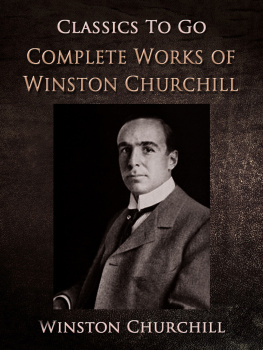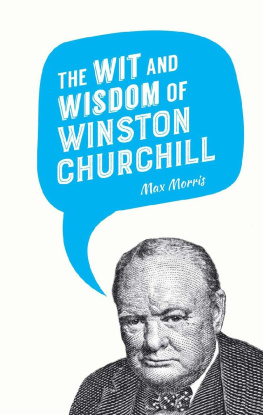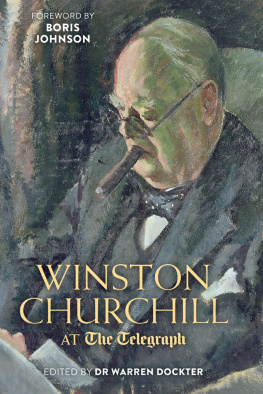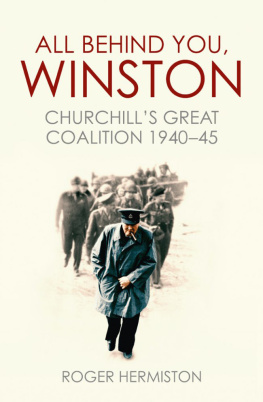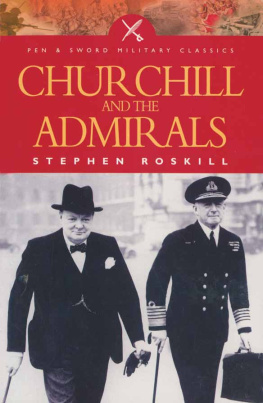WINSTON CHURCHIL L REPORTING

Winston Churchill
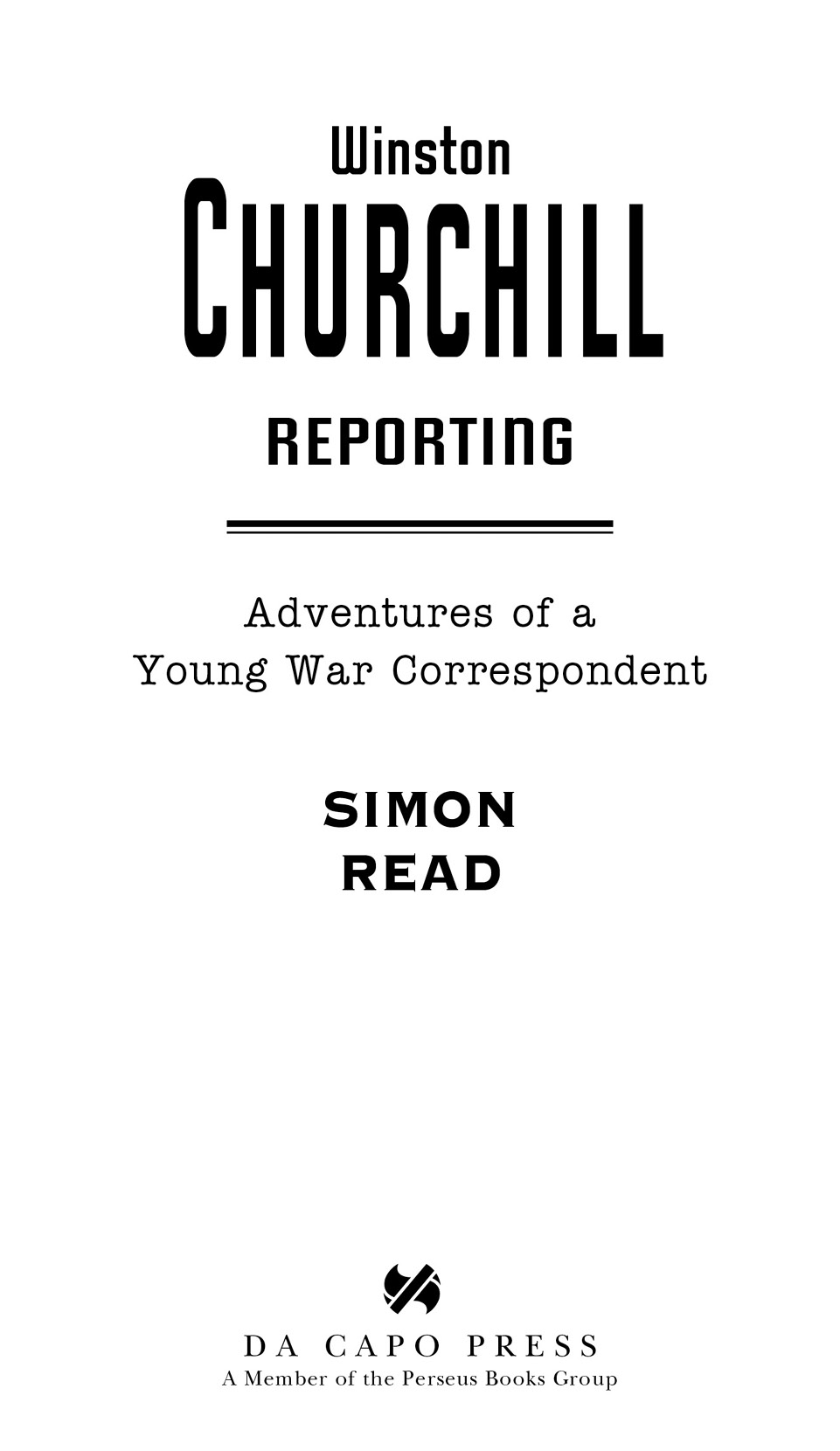
Copyright 2015 by Simon Read
For quotes reproduced from the works of Winston S. Churchill: Reproduced with permission of Curtis Brown, London on behalf of the Beneficiaries of the Estate of Winston S. Churchill.
Copyright The Beneficiaries of the Estate of Winston S. Churchill.
For images reproduced from the Chartwell and Randolph Churchill Collections, held at The Churchill Archives Centre, Churchill College, Cambridge: Reproduced with permission of Curtis Brown, London on behalf of the Sir Winston Churchill Archive Trust.
All rights reserved. No part of this publication may be reproduced, stored in a retrieval system, or transmitted, in any form or by any means, electronic, mechanical, photocopying, recording, or otherwise, without the prior written permission of the publisher. Printed in the United States of America. For information, address Da Capo Press, 44 Farnsworth Street, 3rd Floor, Boston, MA 02210.
Designed by Cynthia Young
Cataloging-in-Publication data for this book is available from the Library of Congress.
ISBN: 978-0-306-82382-4 (e-book)
Published by Da Capo Press
A Member of the Perseus Books Group
www.dacapopress.com
Da Capo Press books are available at special discounts for bulk purchases in the U.S. by corporations, institutions, and other organizations. For more information, please contact the Special Markets Department at the
Perseus Books Group, 2300 Chestnut Street, Suite 200, Philadelphia, PA 19103, or call (800) 810-4145, ext. 5000, or e-mail .
10 9 8 7 6 5 4 3 2 1

This ones for Katie, Spencer, and Cameron,
with much love.
To my sons,
I will say the moral of this story is clear:
Dont give up.
Contents
I can hear the question now: Why another book about Winston Churchill? Because Churchill, complex and multifaceted as he was, offers so many angles from which we can explore his life and career. Books about Churchill generally focus on his role as Great Britains iconic war leader or cover his life in its entirety. The latter tend to paint in broad brushstrokes, if only because theres so much ground to cover. In recent years, however, a number of books have been published focusing on a single aspect of Churchills long and varied life, whether it be his career as an author (Peter Clarkes Mr. Churchills Profession ), his early political life ( Young Titan by Michael Sheldon), or even his culinary tastes (Cita Stelzers Dinner with Churchil l ), to name a few.
But the defining image of Churchill is that of unconquerable warlord: the bulldog scowl, the ever-present cigar, the V for victory salute, and a legacy of soaring oratory that continues to stir emotions. When most of us think of Churchill, we think of him as the icon immortalized by historybut what forces shaped him into the man he became? He was, after all, sixty-five years old when he ascended to No. 10 Downing Street, with a life behind him not short on accomplishment.
Various Churchill biographers will undoubtedly give various answers. As this book attests, I think his most formative years were those he spent as a war correspondent, between 1895 and 1900. He mastered his command of the language writing articles and books, and experienced the heroics and horrors of combat that forever shaped his complex views of war. And it is war for which Churchill will always be remembered. As a side note, it was during this period that he developed a fondness for whisky and discovered the pleasures of a well-made cigar.
As a former newspaper reporter, Ive always been fascinated by Churchill the journalist. The volume in your hands gave me a chance to dive deep into one of the most exciting chapters of an already eventful lifeand one that has not yet been the sole topic of a book.
That said, I dont consider this a biography or a work of historyalthough it contains elements of both. It is, instead, a true tale of adventure featuring Winston Churchill in the starring role. When writing the book, I described it to friends as Winston Churchill as Indiana Jones. As clichd as it sounds, I hope you have as much fun reading it as I did writing it.
Cheers.
Simon Read
June 2015

Outside or inside, I will not return
Till my attempt so much be glorified
As to my ample hope was promised
Before I drew this gallant head of war,
And culld these fiery spirits from the world,
To outlook conquest and to win renown
Even in the jaws of danger and of death.
SHAKESPEARE, KING JOHN ACT V, SCENE 2.
W inston Churchill pondered the blank sheet of paper, his pen poised, ready to spill his thoughts. He would be blunt; nothing else seemed appropriate. Times of war necessitated hard truthsand this one would no doubt land heavily. A small island, a mere speck on the map, was presently the focal point of a desperate struggle, upon which rested the fate of a fading imperial power. He knew the message he needed to convey, but dipped his pen once more into the ink, debating the best way to start. He began with something easy and scribbled the date at the top of the page: October 4, 1895. The island in question was Cuba, currently rebelling against its Spanish master. Churchill wished to see the war for himselfbut first he had to break the news to his mother.
A twenty-year-old subaltern (junior officer) of cavalry in the 4th Queens Own Hussars, he longed for action. There was certainly none to be had in Hounslow, the borough in West London where the Hussars were barracked. Furthermore, judging from the daily newspapers, all seemed quiet across Great Britains empire, which encompassed nearly a quarter of the planet. There were occasional skirmishes one might expect when presiding over so much of the worlds population, but large-scale campaigns were now a rarity. Not since the Crimean War, fought from 1853 to 1856 against the Russian Empire, had British soldiers borne arms in a major European conflict. This was good news for most, but peace was not conducive to young Churchills longing for adventure.
In the course of their daily duties, Churchill and another Hussar subalternReginald Barneshad discussed the quiet state of global affairs. Both knew if they wished to see action, they would have to search for it. Consulting maps and reading the news, it did not take them long to settle on Cuba. While the British Empire thrived, the same could not be said for Spains crumbling global dominion. More than 200,000 Spanish troops were on the island, attempting to crush an insurrection by a native populace tired of Madrids heavy-handed ways. Cuba, with its abundance of fertile soil, was a dominant force in the sugar market. Its cigars were a much sought-after commodity in Europe and America, and its mountains were ripe for the mining of gold and silver. It was no wonder the Spanishwho had nicknamed the island The Pearl of the Antillessought to maintain control of one of their last colonial possessions.








